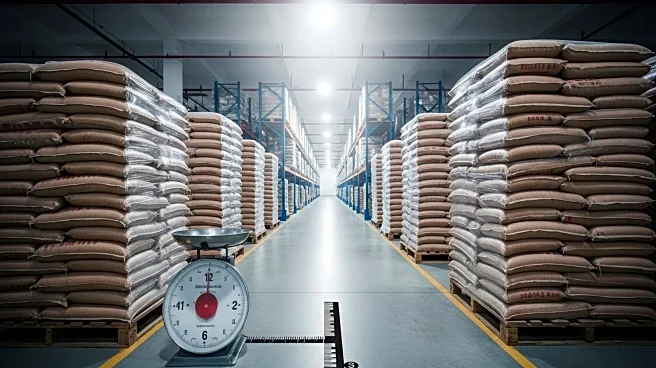What's Happening?
Smithfield Foods is currently facing significant challenges due to China's delay in purchasing U.S. soybeans. As the harvest season begins, this delay raises concerns about storage capacity and price risks for U.S. soybean producers. China, a major buyer of U.S. soybeans, has not yet made purchases from this fall's crop, leading to potential economic strain on U.S. farmers. The situation is exacerbated by the possibility of an economic crisis in the U.S. farm sector, as indicated by a recent survey from the National Corn Growers Association. The survey revealed that a majority of U.S. agricultural producers foresee an economic crisis, which could impact equipment purchases and fertilizer application. Additionally, the Environmental Protection Agency's proposal to exempt small oil refiners from biofuel blending mandates has sparked opposition from the biofuel industry, further complicating the agricultural landscape.
Why It's Important?
The delay in China's soybean purchases highlights the vulnerability of U.S. agricultural exports to international market dynamics and geopolitical factors. This situation could have far-reaching implications for the U.S. farm economy, potentially leading to financial difficulties for farmers and affecting related industries such as farm equipment and input suppliers. The lack of Chinese purchases may force U.S. producers to seek alternative markets or increase domestic storage, which could drive up costs. Furthermore, the potential economic crisis in the farm sector could lead to reduced spending on agricultural inputs, impacting the broader supply chain and economy. The EPA's proposal on biofuel mandates also underscores the ongoing policy challenges facing the agricultural sector, with potential impacts on renewable fuel production and profitability.
What's Next?
The U.S. government and agricultural stakeholders may need to explore new trade agreements or policy measures to mitigate the impact of China's purchasing delays. Efforts to expand domestic markets for soybeans and other agricultural products could be crucial in alleviating storage and price pressures. Additionally, the outcome of the EPA's proposal on biofuel mandates will be closely watched, as it could influence future policy decisions and industry dynamics. The agricultural community may also advocate for increased financial assistance or policy support to navigate the current economic challenges.
Beyond the Headlines
The current situation underscores the interconnectedness of global trade and domestic agricultural policy. It highlights the need for strategic planning and diversification in export markets to reduce dependency on a single buyer like China. The potential economic crisis in the farm sector also raises questions about the sustainability of current agricultural practices and the need for innovation and adaptation in the face of changing market conditions.









